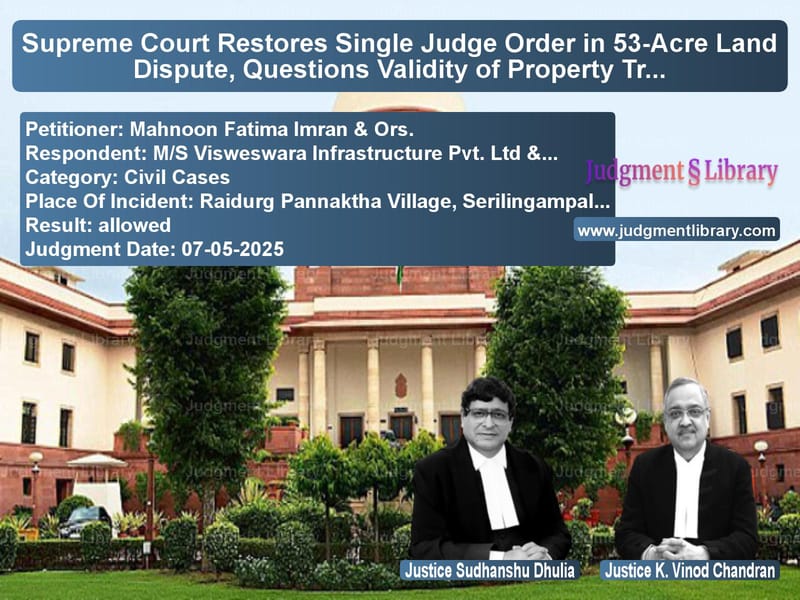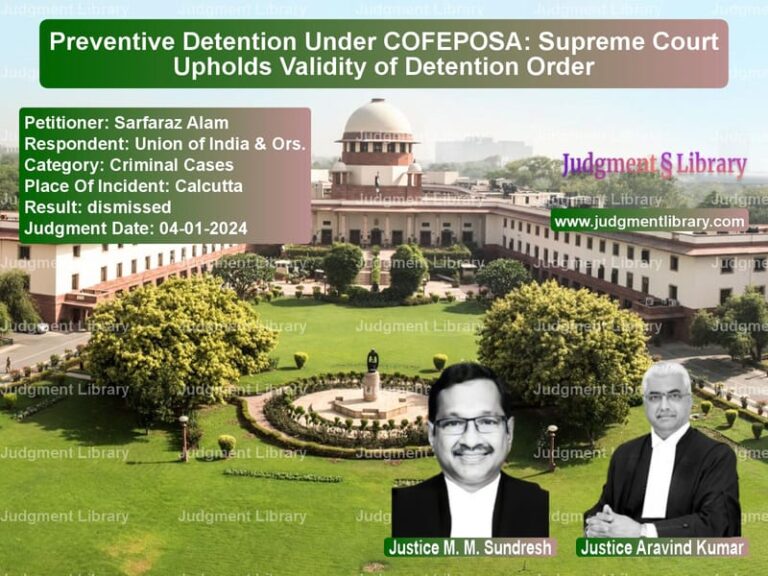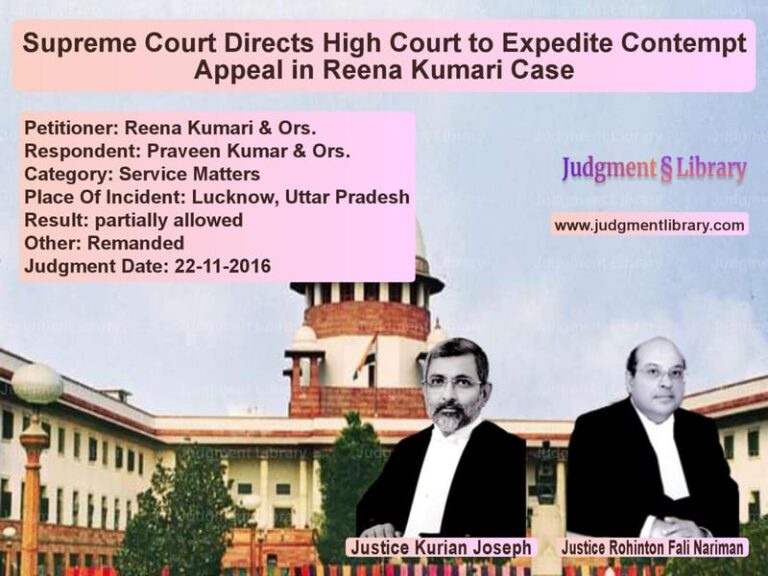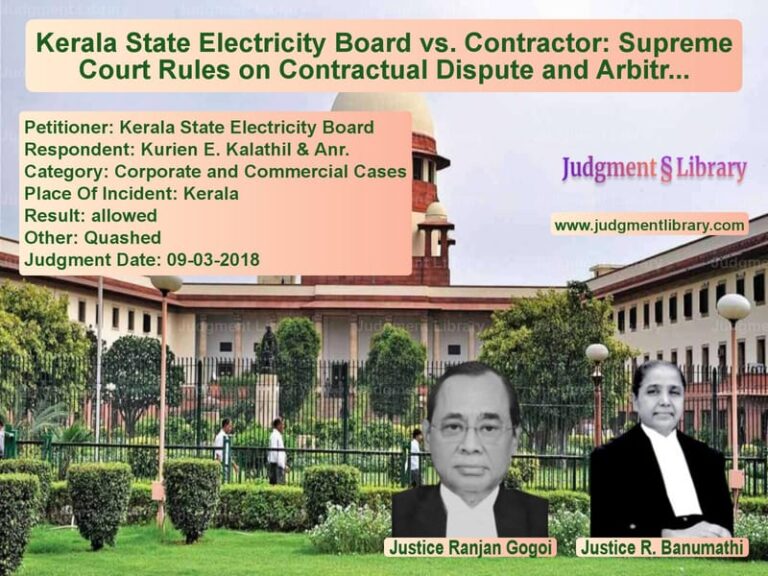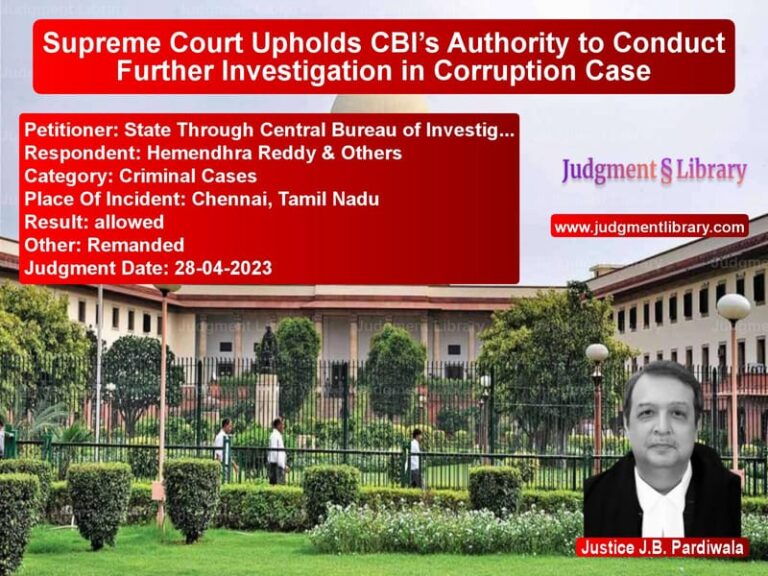Supreme Court Restores Single Judge Order in 53-Acre Land Dispute, Questions Validity of Property Transactions
In a complex land dispute spanning over four decades, the Supreme Court has delivered a significant judgment restoring the order of a Single Judge that had dismissed a writ petition seeking protection against dispossession from 53 acres of prime land in Telangana. The case, which involves multiple layers of litigation under various land ceiling laws, highlights the critical importance of proper documentation and registration in property transactions.
The legal battle revolves around a massive 525-acre property in Survey No.83 of Raidurg Pannaktha Village, Serilingampalle Mandal, Ranga Reddy District, originally belonging to 11 individuals. The specific dispute before the court concerned 53 acres within this larger parcel, with competing claims from the legal heirs of original owners and purchasers who claimed to have bought the land through registered sale deeds.
The Historical Background
The land’s history dates back to the 1970s when the original owners filed declarations under the Andhra Pradesh Land Reforms (Ceiling on Agricultural Holdings) Act, 1973. Approximately 99.07 acres was declared surplus and possession was taken by the State Government on April 11, 1975. Later, the Urban Land (Ceiling and Regulation) Act, 1976 came into force, and the owners filed declarations under this Act as well.
The court noted that “the original owners being the 11 individuals, predecessors in interest of the appellants herein, had a chequered career as is seen from the decisions produced in the records; State of A.P and Ors. v. N. Audikesava Reddy and Ors. and Omprakash Verma v. State of A.P.” These previous Supreme Court decisions had already established that the land had validly vested with the State under the land ceiling laws.
The Competing Claims
The appellants before the Supreme Court were the legal heirs of the original owners, while the respondents (writ petitioners before the High Court) claimed title through registered sale deeds from M/s Bhavana Co-operative Housing Society Ltd. This society, in turn, claimed rights through an agreement of sale dated March 19, 1982, which formed the cornerstone of their claim.
The respondents argued that they had valid title through registered instruments of conveyance and cited the decision in Suraj Lamp & Industries Pvt. Ltd. v. State of Haryana & Anr. to support their position that registered documents should be deemed valid unless set aside by a civil court.
The Supreme Court’s Critical Analysis
The bench comprising Justice Sudhanshu Dhulia and Justice K. Vinod Chandran conducted a thorough examination of the documents and legal provisions. The court made several crucial observations about the agreement of sale dated March 19, 1982, which was the foundation of the respondents’ claim.
The court noted with concern that “the agreement of sale executed by the GPA holder of the original declarants, in favour of M/s. Bhavana Society is produced as Annexure P-33. The agreement is dated 19.03.1982 and the extent of the property agreed to be sold is 125-35 acres.” However, the court found multiple versions of this agreement with significant discrepancies.
In a detailed comparison, the court observed: “The agreement produced as Annexure P-37, though of the same date and the very same vendors and vendees, as is seen from Annexure P-34, the extent differs in so far as it refers to 99.17 acres out of the total extent of 525.35 acres.” The court also noted differences in payment terms and cheque numbers between the two versions of the agreement.
Legal Principles on Property Transactions
The Supreme Court extensively discussed the legal requirements for valid property transfers. Referring to the Suraj Lamp case, the court emphasized that “immovable property can be legally and lawfully transferred/conveyed only by a registered deed of conveyance. Transactions of the nature of ‘GPA sales’ or ‘SA/GPA/will transfers’ do not convey title and do not amount to transfer, nor can they be recognised or valid mode of transfer of immovable property.”
The court further elaborated on the Registration Act, noting that “Section 17 of the Registration Act clearly provides that any document (other than testamentary instruments) which purports or operates to create, declare, assign, limit or extinguish whether in present or in future ‘any right, title or interest’ whether vested or contingent of the value of Rs.100 and upward to or in immovable property.”
Addressing the respondents’ reliance on registered sale deeds, the court clarified that “The observation that registration of a document gives notice to the world that such a document has been executed is not to confer an unimpeachable validity on all such registered documents. Even the respondents/writ petitioners accept that the presumption coming forth from a registered deed of conveyance is rebuttable.”
Suspicious Transactions and Fraud
The court expressed serious concerns about the transactions in question. It noted that “the validation of the sale agreement, which clearly is shown to be not one executed by the declarants, by reason of it materially differing from that produced as Annexure P-33, on the strength of which a suit for specific performance was filed by the vendor, the Bhavana Society, which is also the intended purchaser in the sale agreement of 1982, it smacks of fraud.”
The judgment highlighted that the suit for specific performance filed by Bhavana Society had been dismissed for default on April 6, 2001, and the application for restoration was also rejected on February 23, 2004. Despite this, the agreement was “revalidated” in 2006, raising further suspicions.
Possession Claims Examined
The Division Bench of the High Court had relied on interim orders to establish possession. However, the Supreme Court found this approach flawed, stating that “When dispossession by the State is alleged on the strength of possession, mere reliance on interim orders passed in writ petitions earlier filed cannot establish such actual and physical possession.”
The court referred to Balkrishna Dattatraya Galande v. Balkrishna Rambharose Gupta, emphasizing that “actual and physical possession must be proved, which principle would apply even in a writ petition under Article 226, more strictly since there is no evidence led and the consideration is only based on documents produced on affidavit.”
The State’s Position and Statutory Vesting
The State of Telangana argued that the land had validly vested with the government under the land ceiling laws and that the attempted transactions could not override this statutory vesting. The court noted the State’s submission regarding Section 9-A of the Land Reforms Act, which provides for reopening of cases.
The court observed that “the power of absolute right over lands is on the State and the person in occupation, is only there, by virtue of the grants, which can be brought to an end by the State which has the power of eminent domain. Here there is a statutory vesting of property and prima facie, guile employed in making conflicting claims before the authorities under the Land Reforms Act and the Land Ceiling Act.”
Final Ruling and Reservations
In its concluding remarks, the Supreme Court made it clear that “The cloud on title and the doubts raised on possession by the learned Single Judge, as affirmed by us are merely prima facie observations to deny discretion to invoke the extra ordinary power under Article 226.”
The court restored the Single Judge’s order dismissing the writ petition, but reserved the rights of all parties to pursue their claims through appropriate forums. The judgment stated that “the parties would be entitled to agitate their respective causes, in the appropriate civil forum or if statutorily prohibited, avail of the remedies made available under the statute which proceedings will not be governed by the findings in our judgment, we having only prima facie declined invocation of the discretionary, extraordinary jurisdiction.”
This judgment serves as a significant reminder of the importance of proper documentation in property transactions and the limitations of writ jurisdiction in complex title disputes. It reinforces that registered documents, while carrying a presumption of validity, are not immune to challenge when there are serious questions about the underlying transactions and the vendor’s title.
Petitioner Name: Mahnoon Fatima Imran & Ors..Respondent Name: M/S Visweswara Infrastructure Pvt. Ltd & Ors..Judgment By: Justice Sudhanshu Dhulia, Justice K. Vinod Chandran.Place Of Incident: Raidurg Pannaktha Village, Serilingampalle Mandal, Ranga Reddy District.Judgment Date: 07-05-2025.Result: allowed.
Don’t miss out on the full details! Download the complete judgment in PDF format below and gain valuable insights instantly!
Download Judgment: mahnoon-fatima-imran-vs-ms-visweswara-infra-supreme-court-of-india-judgment-dated-07-05-2025.pdf
Directly Download Judgment: Directly download this Judgment
See all petitions in Property Disputes
See all petitions in Contract Disputes
See all petitions in Specific Performance
See all petitions in Landlord-Tenant Disputes
See all petitions in Fraud and Forgery
See all petitions in Judgment by Sudhanshu Dhulia
See all petitions in Judgment by K. Vinod Chandran
See all petitions in allowed
See all petitions in supreme court of India judgments May 2025
See all petitions in 2025 judgments
See all posts in Civil Cases Category
See all allowed petitions in Civil Cases Category
See all Dismissed petitions in Civil Cases Category
See all partially allowed petitions in Civil Cases Category

